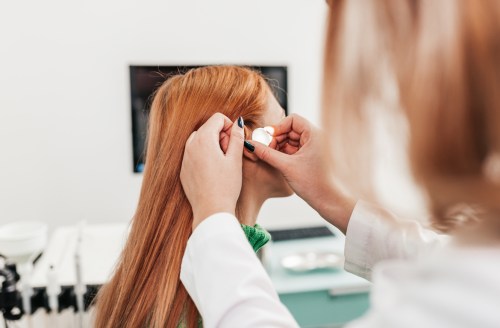It’s a few weeks before my wedding in 2017, and I’m in the doctor’s office being offered a hearing aid. I am 26 years old.
I had just spent 20 minutes in a soundproofed booth, pushing a button whenever I heard a high-pitched tone in the headphones (if you couldn’t guess, I didn’t push the button many times). The doctor is confirming what I already suspected: I had significant hearing loss and would likely benefit from a hearing aid.
There’s no way to pinpoint exactly what caused the damage to my hearing, but a never-ending string of childhood ear infections followed by angsty teenage years spent plugged into an iPod Nano at top-volume could go some way to explaining it. Did my hearing get worse because I damaged my ears listening to loud music, or did I listen to music loudly because my hearing was already damaged? The answer is probably both.
My poor hearing has meant that I’ve always struggled to take part in social situations. I don’t know that someone is behind me trying to get my attention, so I don’t answer them. I can’t follow the train of a group conversation, so I zone out. I mishear verbal instructions, so I do the wrong thing. To anyone who doesn’t know about my hearing loss, I can seem rude or ignorant. For me, I feel left out of social interactions. The social isolation I experienced is not unique to my hearing loss, according to Dana David, who researches self-stigma and hearing loss at the University of Haifa in Israel. There is even a risk of depression (which I am on medication to manage) that comes with not using a hearing aid when you need one.
Nonetheless, I couldn’t shake the immediate image of a little old lady looking for her hearing aids and her false teeth. My actual response to the suggestion that I might need a hearing aid was, “I’m not a grandma.”
I was more afraid of being perceived as old or incapable than I was of being unable to hear, a concern that, according to David, is common. And yet hearing loss isn’t something only grandparents grapple with: Around 7 percent of people in their twenties have noise-induced hearing damage, and this risk increases with age.
Around 7 percent of people in their twenties have noise-induced hearing damage, and this risk increases with age.
It isn’t only age-related ableism at play here though. Carole Johnson, PhD, an audiologist and researcher at the University of Oklahoma’s Health Sciences Center, says that young people tend to be put off wearing hearing aids because of the way they look, and I was no different. We all like to think we’re not vain, but when the audiologist asked why I was reluctant to get hearing aids, I could only sheepishly reply that I was worried they’d look weird. The audiologist brushed it off, “Nobody will ever notice these tiny hearing aids with all that hair.” He had a point. My hearing aid isn’t visible when I wear it with my hair down. But if it was, that shouldn’t be a problem. Even as perceptions of hearing aids have normalized in the past few years thanks to the popularity of wearable tech like wireless earbuds, my hearing loss doesn’t make me stupid, and it certainly doesn’t make me old.
And yet another major barrier to younger people using hearing aids is the cost. “Hearing aids are one of the most expensive items someone may purchase next to that of a home or a car,” Dr. Johnson says. The devices range from $1,000 to $6,000 or more apiece, and with hearing loss in both ears, like mine, that cost can double. I live in the UK so my audiology tests, hearing aids, and even replacement batteries are all free on the National Health Service, but most insurance providers in the United States do not cover the cost of hearing aids. I’m lucky that didn’t have to complicate my decision as I suspect I would have gone much longer without a hearing aid if I had had to pay upfront for it.
I finally booked that second audiologist appointment last summer at the age of 29, after much persuasion from family and friends, sick of having to repeat themselves. After getting back in the booth and (not) pressing the button, I agreed to give hearing aids a try.
The results were quite literally ear-opening. In the office and in the pub, I could hear everything people said to me. I could even take part in multiple conversations at once, if I wanted to (Although I had to stop wearing my hearing aids at the office sometimes because it turns out that being able to take part in every single conversation wasn’t conducive to doing my job well). I can hear leaves crunching under my feet in the autumn, and I can hear birds chirping in the spring. The first time I stepped into a supermarket wearing my hearing aids, I idly wondered when they had started piping music into the store, not realizing that it was always there. I’d just never heard it before.
Sign Up for Our Daily Newsletter
Get all the latest in wellness, trends, food, fitness, beauty, and more delivered right to your inbox.
Got it, you've been added to our email list.











